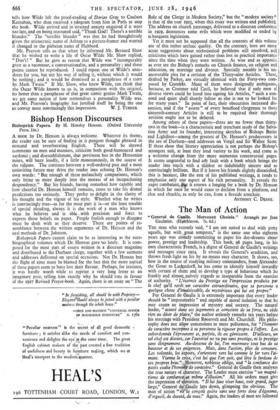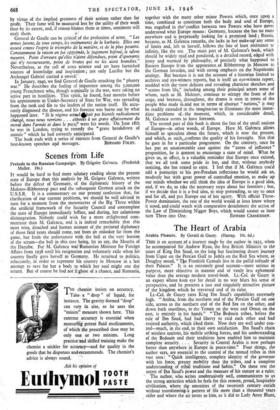The Man of Action
"General de Gaglle. Morceaux Choisis." Arranges par Jean Gaulmier. (H‘gchin. son. 7s. 6d.) THE man who recently said, " I am not suited to deal with petty squalls, but with ,,great tempests," is the same one who eighteen years ago was already committing to paper his day-dreams abOut power, prestige and leadership. This book, 98 pages long,' in his own characteristic -French, is a digest of General de Gaulle's writings and messages since 1924. It reveals the General's erudition, and throws fresh light- on his by no means easy character. It shows, too, how in the course of studying military commanders, from Alexander the Great to Luckndorff, he has come to identify himself inwardly with certain of them and_to develop a type of behaviour which he frankly and ahnosknalvely regards as inseparable from the exercise of authority. " L'essenee du Prestige est ('impression produite par le chef qu'il revel un caractere extraordinaire, qua sa personne a quelque chose d'insaisissable, de mysterieux qui lui est propre." For General de Gaulle it is extremely important that every leader should be " impenetrable " and capable of moral- isolation so that he may create an impression of 'mystery and secrecy. The natural leader, "assure dans ses jugements et conscient de sa force, ne cede rien au desir de p/aire," the author artlessly remarks ten years before his meetings with President Roosevelt and Mr. Churchill. His philo- sophy does not allow concessions to mere politeness, for "l'honpne de caractere incorperre a sa personne la rigueur propre a reffort. Les subordonnes reprouvent et, parfois, ils en gemisserit. D'ailleurs, un tel chef est distant, car rautorite ne va pas sans prestige, ni le prestige sans eloignement. --Au-dessous de lui, ran murmure tout bas de sa hauteur et de ses exigences. Mais, dans Faction, plus de censeurs. Les volontes, les eipoirs, s'orientent vers lui comma le fer vers rai- mant. Vienne la crise, c'est lui que Fon suit, qui lave le fardeau de ses propres bias.". However, noblesse oblige, and "la confiance des petits exciterhotnrWde caractere."‘ General de Gaulle then analyses the true nature of character. The Leader must exercise "un magne- tisme de conftance et meme d'illusion." All his orders must- give the impression of-elevation. "Il lui faut viser haut, voir grand, juger large," General de; Gaulle lays down, glimpsing the obvious. Tice man of action " rifle concoit guere sans une forte dose d'egotsme, d'orgueil,. de dureti, de ruse." Again, the leaders of men are followed by virtue of the implied greatness of their actions rather than for profit. Their fame will be measured less \by the utility of their work than by its extent, and, if reason blames them at times, sentiment will exalt them.
General de Gaulle can be critical. of the profession of arms. "Les armes furent, de tous temps, les instruments de la barbarie. Elles ont assure contre !'esprit le triomphe de la matiere, et de la plus pesante. Constamment la raison en fut opprintee, le jugement bafoue, le talent nteurtri. Point d'erreurs qu'elles n',aient defendues, point d'ignorants qui n'y recourussent, point de brutes qui ne les aient brandies." Nevertheless, at the call of arms science and art have furnished sources of knowledge and inspiration ; nut only Lucifer but the Archangel Gabriel carried a sword:- In January, 1940, we find General de Gaulle attacking the " phoney war." He describes the feeling of impotence among the 5,000,000 young Frenchmen who, though nominally in the war, were taking no active part in hostilities. This-spirit, he found, four months before his appointment as Under-Secretary of State for War, was spreading from the rank and file to the leaders of the nation itself. He accu- rately diagnosed the disease, and his-forecast was borne out by what happened later. "Si le regime actueletait pas bientot radicalement change, nous nous verrions . . . exposes a un grave affaissement du moral :dans Parmie a dans le pays," were his words. On June 18th he was in London, trying to remedy the " grave breakdown of morale " which he had correctly anticipated. The book ends with a series of extracts from General de Gaulle's best-known speeches and messages.. BERNARD FOLEY.































 Previous page
Previous page